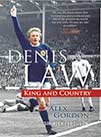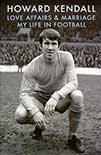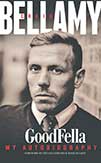 King and country
King and country
by Alex Gordon
Arena, £17.99
Reviewed by Archie MacGregor
From WSC 323 January 2014
It’s easy to understand why Denis Law was, and still is, idolised by so many Scotland fans. As this chronicle of his international career reminds us, he just loved pulling on the navy blue jersey. There’s a palpable sense that he was just as excited and proud about his last cap – in Scotland’s opening 1974 World Cup group match against Zaire – as he was when he made his debut against Wales in 1958.
He could play a bit too, which helped of course. Law remains, alongside Kenny Dalglish, his country’s record goalscorer with 30 to his name. Twice he scored four goals in a game and he put a few in the back of the net against England. No doubting the iconic status of “the Lawman” then, but the trouble is this book just about goes right off the scale with the adulation. Superlatives are served up by the trowel – there’s just about a different one for every goal that Law scored in his entire senior career and he got 325 of them. So it’s not only the constant references to games from the Home Internationals and Scotland appearing in World Cup finals that evoke a bygone age. In an era where the warts-and-all biography laden with tales of compulsive behaviour disorders and dysfunctional relationships within dressing rooms is now the accepted norm you are left craving more gritty insight.
While the idiosyncratic Aberdonian seems nothing other than a down-to-earth type there are still a few aspects of his international career that would surely have justified some considered scrutiny. It’s widely accepted that spanning the 1960s the Scotland team, blessed with talents such as Law, Jim Baxter, Jimmy Johnstone and others, underperformed by quite a margin in World Cup and European Championship qualifiers, failing to reach the finals of either between 1958 and 1974. Just how much did the obsession with giving the English a right doing, personified by Law, distort and distract the national side’s focus?
Even when Law was part of the squad that was taken to the 1974 finals there was a fair bit of hullabaloo about his inclusion which is only lightly dwelt upon here. It’s pointed out that then manager Willie Ormond robustly defended the decision – however the fact that he was immediately dropped after the Zaire opener is surely a pointer that this was an issue worthy of more thoughtful examination. The trials and frustrations that Law faced with his lengthy injury woes and loss of form from 1967 onwards is another facet barely touched on.
Still, if as a kid like me you went around parading the trademark clenched cuff salute every time you scored a goal in the playground, there is probably more than enough here for you to enjoy wallowing in the nostalgia. It’s just a shame we don’t learn as much about Law the enigma as Law the legend.
 My life in football
My life in football
 The row over Tottenham fans’ use of the word yids has started a wider debate about discriminatory terminology, argues
The row over Tottenham fans’ use of the word yids has started a wider debate about discriminatory terminology, argues  My autobiography
My autobiography